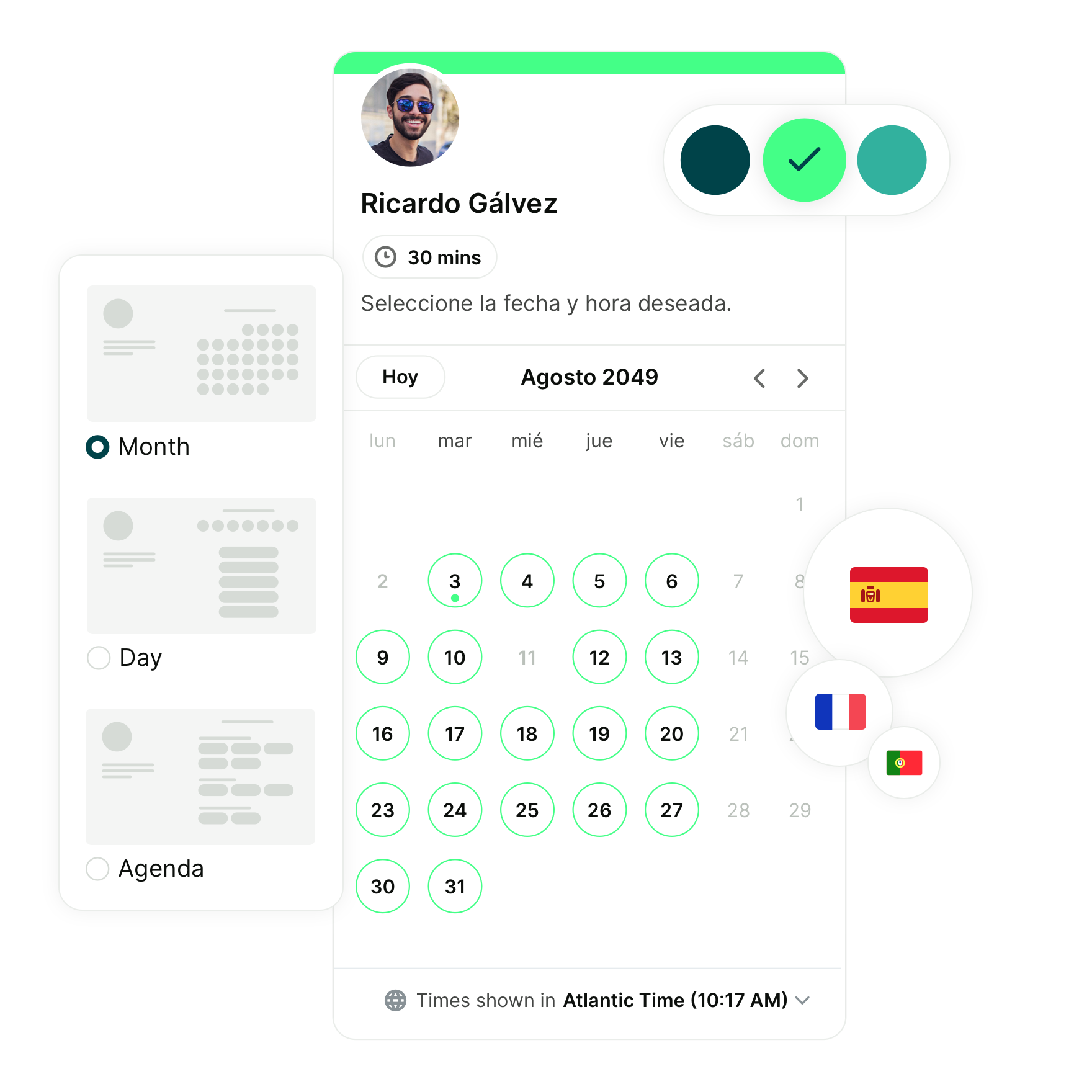11 SMS Best Practices Small Businesses Should Know Before Hitting Send
Queue the Love Island voice: You’ve got a text! Learn why SMS communications are often more effective than email marketing, along with the most important SMS best practices to follow.

Hailey Hudson

Ready to book more meetings?

Contents
As a small business, you likely communicate with your customers in a variety of ways. Whether it’s sporadic back-and-forth emails with random questions, or regular online meetings, you’re constantly communicating with clients across a wide range of channels.
But have you ever considered using SMS for your business?
Businesses that text their customers are over 217% more likely to see success than businesses who don’t. Consumers want to receive texts from you, and SMS messaging has a good ROI.
You can utilize text messages for virtually any purpose—appointment reminders, special promotions, your rewards program, shipping notifications, and more.
With a 98% open rate and a click-through rate of 36%, SMS messages are often more effective than channels like email. But to reap the full benefits, you have to do it right.
Ready to get started? Let’s take a look at why SMS works so well and the best practices you should follow to see success.
The importance of SMS communication
If you’re looking to communicate directly with your customers in a way that works for them, texting is a smart choice. Sending SMS messages to your clients helps you:
- Cut through the noise. We all get a lot of emails and text messages each day. But, whether or not they actually get seen is another story. In fact, SMS has an average open rate of 98% while email is around 29% for professions like consultants.
- Get a quicker response. The average SMS response rate is 45%. For email, that number drops to just 6%. If you want your client to answer you, text is the way to go.
- Provide a better customer experience. Not all of your customers want to receive emails. And not all of them want to get phone calls, either. Offering reminder texts as an additional option helps drive a better customer experience. 19% of customers say SMS is their top preference for brand communications.
- Reduce no-shows. By sending appointment reminders and appointment confirmation text messages, you’re actively reducing no-shows for your business.
|
“Before I turned SMS reminders on, I had almost 20% of appointments canceled. After turning them on, that went down to less than 1%.” |
11 SMS best practices to consider for your small business
Before you craft your SMS strategy, read over these SMS best practices to ensure your texts are delivering what your customers want.
1. Get permission
Don’t text your customers unless you have their permission. Using a scheduling tool, you should get written consent by adding a line in your booking form, where customers can check a box if they’d like to opt-in to receiving SMS messages from you.
All messages you send should also align with your privacy policy, which communicates to customers how you gather and store their information. If needed, include a link to your privacy policy in your texts to customers or on your business page. This is especially important to share considering that 70% of customers are concerned that texts from brands are a security risk.
|
💡 Pro tip: Here's a step-by-step guide on how to set up an SMS opt-in on your booking form. |
2. Consider timing
For an appointment reminder text, sending a text 48 hours before the appointment date and time is your best bet. For anything else, some data shows that Tuesday and Saturday are the best days of the week to reach out. Texts sent during the latter part of the week tend to produce higher conversion rates.
3. Send during waking hours
A surefire way to get on somebody’s bad side? Sending a text that wakes them up in the middle of the night. In one study, 25% of customers said brands “constantly” or “often” text at inappropriate times such as late at night. Respect your customers by ensuring that your texts only go out during the day.
But you don’t have to stick to the typical 9-5 business hours: Some data suggests that it’s effective to time your messages when people are likely to be on their lunch break or off work. Texts sent after 5:00 PM have a click-through rate that’s 6% higher than texts sent before.
4. Monitor frequency
If you’re only sending SMS messages as appointment reminders or confirmations, you’ll set up the texts to send automatically when a client takes a certain action.
However, if you also plan to use SMS as a channel for general marketing messages and promotions, you’ll need to consider how frequently you want to text customers. According to research by Upland Software, a good rule of thumb is to start with 4-5 messages per month max and see how that lands with your client base.
5. Identify yourself
Don’t assume your customers know who you are. Many people balk at a text message from an unfamiliar number. After all, most SMS platforms don’t send texts from your personal number. At the beginning of the text, introduce yourself and your brand. For example:
| “Hi, [first name]! This is Steph from Perimeter Salon. I’m reaching out to confirm your appointment…” |
If relevant, you can also explicitly tell recipients that you’re a human—not a bot—as a way of encouraging them to text you back. These SMS appointment reminder examples can be a great source of inspiration.
6. Be concise
For most SMS tools on the market, the character count limit is 160 characters. Don’t try to cram too much into this short space. Hone in on the single most important message you need to get across. Other, less crucial information can wait—or you can share it via a different channel.
|
“Be short and to the point. If you write a novel, it’s likely that your recipient won’t read it all” |
7. Include a call-to-action
To increase engagement, add a call-to-action (CTA) at the end of each text. This might sound like:
- “To confirm, reply Y”
- “Got questions? Call us at…”
- “Book your next appointment now with this link”
Your CTA doesn’t need to be long or complex. In fact, shorter CTAs often pack more of a punch. But they’re an important way of converting leads into customers, or existing customers into repeat ones.
8. Personalize messages
No matter what kind of marketing messages you’re sending, personalization is always a good call. In fact, consumers are more likely to make repeat purchases and refer their friends to brands that personalize interactions.
You can personalize marketing text messages by:
- Including the customer’s name or location
- Sending a birthday text
- Including the appointment type
- Adding product and shipping details
- Sharing content or promotions that are relevant based on interests they’ve shared with you
- Segmenting your SMS list
9. Add an easy opt-out
An important SMS marketing best practice is to provide customers with an easy way out. Add a simple line at the bottom of each text saying, “Respond STOP to unsubscribe.” If your platform requires a double opt-out, add a link to a webpage where they can unsubscribe.
10. Respond to messages
Texting is not a one-way conversation. If a client texts you back with a comment, question, or complaint, respond to them! Answer within 24 hours to keep the conversation going (and reinforce that there is in fact a human behind the message).
In some cases, you may also want to give customers a deadline for their response. For example, ask them to reply confirming an upcoming appointment 24 hours ahead of time.
11. Have the right platform in place
Make sure your SMS messages are sent promptly and accurately by using an automated platform that handles the process for you.
YouCanBookMe offers SMS reminder texts to both paid and free users. Purchase a set number of SMS credits and then add a line to your booking form where your customers can opt in to text messaging. You’ll then write the text, set up the trigger action, and YCBM will automatically send out customer messages.
SMS marketing is an effective method of building your small business—and an automated platform like YouCanBookMe is the easiest way to do it. Get started with a free or paid YCBM account.
Subscribe to our newsletter
Get productivity tips, news, articles and resources.
Written by
Hailey Hudson
Hailey is an Atlanta-based, full-time freelance writer who works with clients in the healthcare, marketing, and tech industries. When she's not writing, she's probably belting musical theatre songs or snuggling with her feline WFH supervisor, Windy.



